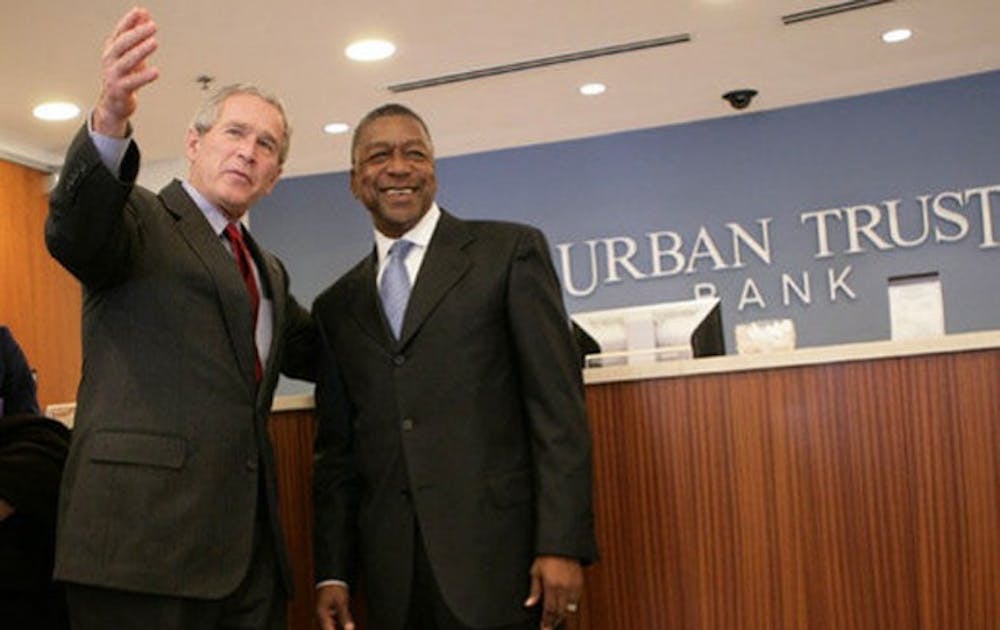Bob Johnson, founder of Black Entertainment Television network and former owner of the Charlotte Bobcats NBA team, believes that success comes from seizing opportunities.
As the keynote speaker at the Fuqua School of Business’s MBA Workshop for Minority Applicants, Johnson described his career trajectory in front of a full house at Fuqua’s Kirby Reading Room Friday.
When he was a cable company lobbyist, Johnson met businessman John Malone, who at the time owned the third largest cable company in the United States. Malone told Johnson to come talk to him whenever he had an idea.
“That part right there is what I call the beginning of what I call ‘the Bob Johnson Luck,’” he said.
After that invitation, Johnson set about trying to come up with an idea to show Malone. He realized that while there were magazines and radio stations targeting the black demographic, the same was not true for television—mostly because up to that point, television channels could not be targeted to certain households in the way magazines could. But the advent of cable made it easier for television channels to reach specific demographics.
“All of the sudden, with that technological revolution, you had the ability to aggregate African American households all across the country so that one could create niche programming,” Johnson said.
He saw BET as simply an extension of what already existed in magazines and radio and “putting it into a new technology.”
The actual founding of BET took place in 35 minutes. Johnson brought his idea to Malone and asked for $500,000 in funding to start BET—a sum of money so large that it would have been incomprehensible to him just a few years before.
“I’m from the small town of Freeport, Ill., and there are 30,000 people in town, 10 percent African American, so 3,000 African Americans,” Johnson said. “500,000 would be equal to the total GDP of every black person in town. So I’m about to ask for more money than anybody in the entire town has seen in their lives.”
Malone put down $180,000 in equity and a $320,000 loan, establishing himself as a 20 percent owner, with Johnson owning the other 80 percent.
“What Malone didn’t know at the time was that if he had reversed the numbers and said, ‘I’ll be 80 and you’ll be 20,’ I would have said, ‘John, that’s a deal,’” Johnson joked.
Having never run a company before, Johnson asked Malone for advice. Malone told him to work to increase revenues while keeping costs low—advice Johnson jokingly called “his MBA.”
Malone’s faith in him and initial investment would stay with Johnson. He cited Malone’s backing of BET as a source of credibility for the young company that endured beyond its startup phase.
“When I went out to borrow money for BET, or when I went out to get cable operators to carry us, the first thing the guy who’s a banker asks is, ‘Who else is in the deal?’” Johnson said. “Mainly because I was black... but you don’t get $500,000 to grow on trees.”
Johnson, however, was able to say that Malone was “in the deal.” While Johnson eventually paid back the initial $320,000 loan, Malone never sold his initial BET shares and when Viacom bought the company in 2003, he made a return of $700 million on his $180,000 equity investment. Malone made a profit, but ownership of BET made Johnson the first black billionaire.
“I fundamentally believe that if there were more John Malones in this society, there would be more Bob Johnsons,” Johnson said.
He said that society needed to find a way to make capital access more available to black businesspeople.
“It is becoming more and more difficult to gain access to capital and not because of scarcity of capital,” he said. “There is a trillion dollars sloshing around this economy, but none of it is blowing our way.”
He believes that in many situations, black people and other minorities just need the opportunity to get their foot in the door.
“My story is because someone in the white community said, ‘I want to back this young African- American guy on this idea called BET,’” he said. “It was a real roll of the dice kind of gamble. But somebody did that, and it paid off.”
He said that as he is nearing the end of his career, he wants to see more black and minority Americans prove to the broader society that they deserve the right to manage and create value out of the wealth of the nation. Johnson invented what he calls the RLJ Rule to give back. Based off the NFL’s Rooney Rule, the voluntary policy commits companies to interview at least one minority applicant for any position at or above the director level.
“I’m not asking for any form of reverse discrimination, but I just have to live with the facts,” he said. “If you can’t get access to pursue your dream, you will not be able to be competitive.”
Kodjo Bissah, a prospective MBA student from Dallas-Fort Worth, Texas, has long considered Bob Johnson a personal hero and found his speech inspirational.
“That’s something, when you see that someone who looks like you had a chance of success,” Bissah said.
Get The Chronicle straight to your inbox
Signup for our weekly newsletter. Cancel at any time.

